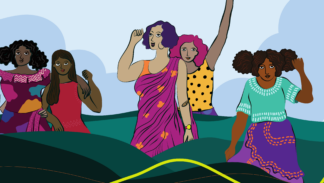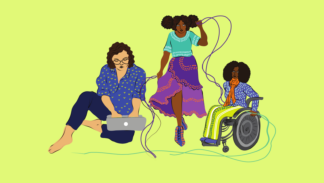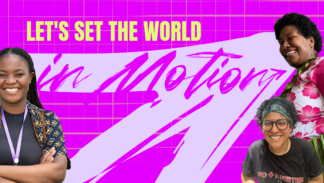What’s innovation got to do with it?
Rania Eghnatios — Project Manager, RootsLab, Lebanon
In 2013, the Association for Women in Development (AWID) launched a report titled “Starving the roots, watering the leaves.” The report’s main message focused on how there has been increased attention to individual women and girls in recent years, but little support “for the sustained, collective action by feminists and women’s rights activists and organizations.” Inspired by this reality and the conviction that it is only through building strong movements, rather than empowering individual women, that we can create systemic change, RootsLab was born. The exciting social innovation lab aimed at strengthening and extending the roots of movements by incubating social change driven by young women and trans* folks was created through a partnership among FRIDA | The Young Feminist Fund, Global Fund for Women, Oxfam, and the Young Foundation.
In March 2017, RootsLab’s first pilot program was launched in Lebanon. An inception workshop was organized in April and representatives from the four partner organizations, as well as local feminist organizations, were in attendance. At this workshop, our RootsLab team of seven women, all of whom often work remotely, met face-to-face. During this time, we worked, debated, and bonded over the course of four inspiring days. The energy and excitement in the room was palpable. We solidified our global partnership and cultivated relationships with feminist collectives in Lebanon who are interested in learning about the project and exploring potential collaborations.
The level of engagement of local feminist groups with the project was remarkable.
Having been involved in the feminist movement in Lebanon since a very young age, I understand the power that comes from young women coming together to develop and test their ideas. Whether these ideas succeed or not, the energy that is born out of these encounters has the potential to grow and create lasting change. I, along with other feminists, also understand the need to build a strong and sustainable movement in Lebanon, capable of enduring and growing through shocks, attacks, and crises. This involves being able to truly welcome new generations of activists into our spaces, and most importantly, learning from our past mistakes and successes. The linkages we seek to build through RootsLab will create opportunities for mutual learning, and will help us avoid recreating the generation gap that exists today in Lebanon between feminist groups that have emerged in the past seven years and the older women’s rights organizations.
Groups that we have engaged with so far are interested in RootsLab for different reasons. However, it is the idea of supporting new feminist initiatives led by young women and trans people across Lebanon, that drew them to the project. Some of them spoke of the challenges they face in welcoming young activists into their work as they do not have the structure and resources to support and engage them. Others reiterated the need for the project to be truly led and shaped by young women and trans* folks; by their visions, lived experiences, and needs. They also voiced shared concerns over addressing and shifting power when working with young women through giving participating groups full control over their interventions.
If you ask different people who have been engaged with RootsLab what they find most interesting about the project, you will get different answers. That is the strength of RootsLab. In fact, through its collective process, RootsLab allows space for these diverse perspectives, providing everyone involved with opportunities to grow and strengthen their work on gender justice. However, what I personally find most interesting about our project is its desire to depart from the status-quo in the development field, the feminist movement, or even the social innovation field. RootsLab shifts the way we do gender justice programming. It gives young women the power to decide what issues to address and how to address them by shifting away from traditional donors and international organizations. This takes participatory processes one step further. In fact, RootsLab acknowledges that young women who experience injustice in their daily lives are the ones who should be imagining ways to fight it. In many cases, these young women already have innovative solutions but lack opportunities and support to develop and test them. Developing these interventions cannot happen at a consultation workshop. This is where RootsLab comes in—providing a one-year structured support process that includes seed funding to develop and test their ideas.
Innovation, to me, is about generating that shift in power dynamics. It is also about breaking out of the systems that indoctrinate us and program our language, actions, thoughts, and ways of doing things. These systems can be either formal or informal; inefficient processes, dominant cultures, hegemonic discourses, ideologies, rigid tools of analysis, unquestioned preferences… They exist in our society, institutions, communities, organizations and even social justice movements. Breaking out requires paying attention to people, relationships, and processes. It also requires reflection and questioning, and a lot of flexibility for quick adaptation, inclusiveness of diversity on every level, and openness to unfamiliar territories. But most of all, it requires will and persistence in swimming against the current, whether inside our teams, organizations, and movements, or with external actors such as donors. RootsLab is committed to embodying these practices.
Innovation, to me, is about generating that shift in power dynamics. It is also about breaking out of the systems that indoctrinate us and program our language, actions, thoughts, and ways of doing things.


